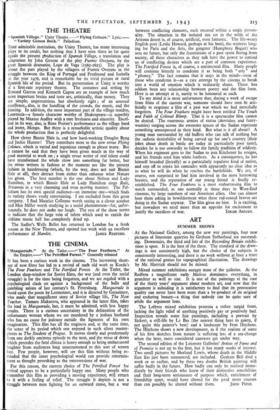ART
SUMMER SHOWS
AT the National Gallery, among the new war paintings, four new pictures of limestone quarries by Graham Sutherland are outstand- ing. Downstairs, the third and last of the Recording Britain exhibi- tions is open. It is the best of the three. The standard of the draw- ings is not consistently high, but the choice of the subjects is consistently interesting, and there is no work without at least a trace of the national genius for topographical illustration. The drawings by Mr. Hartrick should not be missed.
Mixed summer exhibitions occupy most of the galleries. At the Redfern a magnificent earlry Matisse dominates everything, in grandeur as well as size. It is one of the paintings at the root of the thirty years' argument about modern art, and now that the argument is subsiding it is satisfactory to find that its provocative quality can never have been more than a by-product of its original and enduring beauty—a thing that nobody can be quite sure of while the argument lasts.
The Lefevre mixed exhibition presents a rather turgid front, lacking the light relief of anything positively gay or positively bad. Inspection reveals some fine paintings, including a portrait by Sickert, a still-life by Le Bas (the nearest thing here to gaiety, if not quite this painter's best) and a landscape by Ivon Hitchens. The Hitchens shows a new development, as if the realism of some of his first sketches from nature is suffering less of a sea-change when the later, more considered canvases get under way.
The second edition of -the Leicester Galleries' Artists of Fame and of Promise is not up to the first, but it has many works of interest. Two small pictures by Morland Lewis, whose death in the Middle East has just been announced, are included. Graham Bell died a week or so earlier, and by these two deaths British painting will suffer badly in the future. How badly can only be realised imme- diately by their friends who knew of their distinctive sensibilities and their long-term seriousness of purpose which, enrichment of friendship apart, would have altered for the good more courses
than can possibly be altered without them. JOHN PIPER.


























 Previous page
Previous page